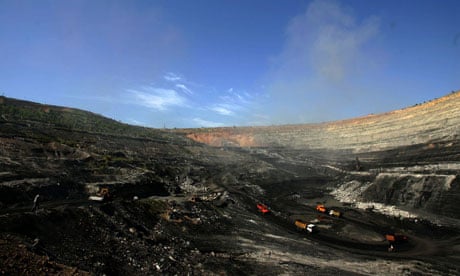It was interesting how the only people I met taking the long view at the UN climate negotiations in Doha this week worked for the fossil fuel industry. Everyone else seems to have given up on the world after 2050 and is just talking about short-term measures to mitigate and adapt to climate change over the next few decades.
But when you work for an industry with 150 years of production at current rates under its collective belt – and a proven track record of doing better than expected at finding more – it's your job to think about the big picture. Whereas the negotiators' only job is to make progress towards their targets for 2020.
The big picture is actually a lot simpler than these arcane negotiations. We had about 4tn tonnes of fossil carbon underground in 1750 and we've burned just over half a trillion tonnes so far (including quite a bit of rainforest) and dumped the CO2 into the atmosphere. Unless we pump it out again, this CO2 will continue to influence climate, in effect, forever – until nature turns it back into rock.
Every trillion tonnes of carbon we "de-fossilize" in this way commits us to about two degrees of warming. So if we are serious about avoiding more than a two-degree temperature rise, we have something under half a trillion tonnes to go. Perhaps a bit less and if you are optimistic, perhaps a bit more, but that is the ball park figure. The only question that really matters for the long-term fate of the climate is what we are going to do with the second, third and fourth trillion tonnes of fossil carbon.
This leaves only two options: either we burn it, dump the CO2 generated into the atmosphere and live with the consequences (at two degrees per trillion tonnes the maths isn't very complicated) or we burn it and bury the CO2 underground. You only had to look around yourself in Doha to realise that the third option, abstemiously leaving it untouched, simply isn't on the table.
So how can we get to the point where we pump fossil carbon back underground at the same rate we are digging it up? Again, Doha has the answer: the city proves that with enough cheap fossil energy, we can do anything. If industry were required to bury, as CO2, a steadily increasing fraction of the carbon they dig out of the ground using carbon capture and storage (CCS) as a condition of continuing in this extraordinarily profitable business, of course they would work out how to do it. They might not even complain that much – provided the same rules applied to everyone.
The cost of fossil carbon to consumers would rise as the sequestered fraction increased, but a lot more predictably than any politically-determined carbon tax or cap-and-trade regime – and, unlike the tax or emission permit, we could at least see the additional cost was paying to solve the problem. The worry that CCS is too expensive is beside the point: no matter what it costs, we're almost sure to find some productive uses of that fossil carbon.
The real problem with the UN Framework Convention on Climate Change negotiations is not that they are failing – the whole process is ill conceived in the first place; people still pretend that with just a bit more effort and airmiles they might succeed. Far better to admit defeat and start again, treating the problem as it should be treated: as a simple issue of industrial waste disposal, not a global collective conscience-fest.
Professor Myles Allen is director of the Oxford Martin Programme on Resource Stewardship at the University of Oxford
This content is brought to you by Guardian Professional. Become a GSB member to get more stories like this direct to your inbox

Comments (…)
Sign in or create your Guardian account to join the discussion